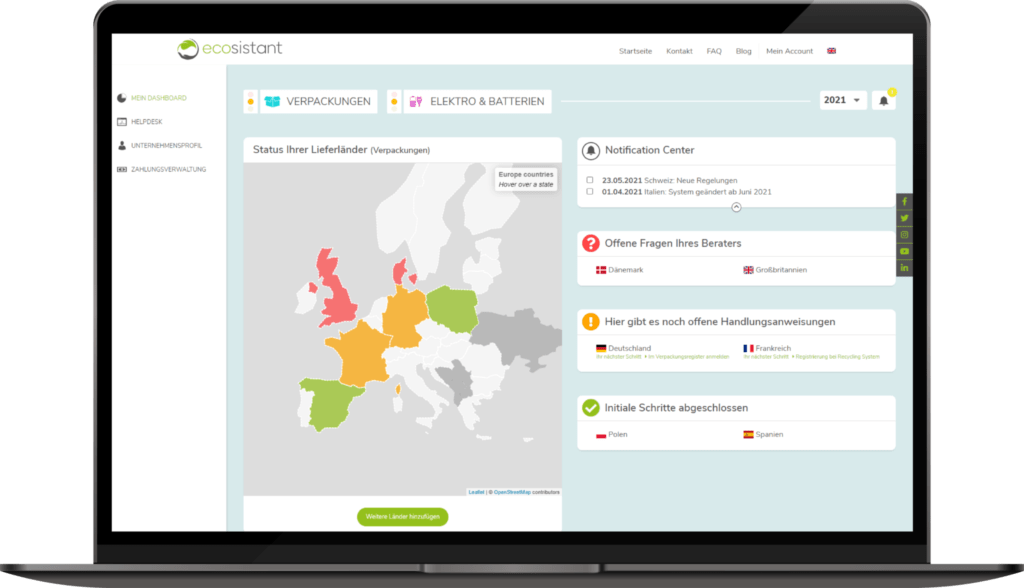Implement EPR requirements for Amazon, eBay & other platforms
Includes paid promotion: The term Extended Producer Responsibility (EPR) has gained much attention by legislators and the e-commerce community recently. A lot of EU countries include this term in new laws that require producers and dealers to comply with new regulations. Large internet platforms and marketplaces such as Amazon and eBay start to check the EPR registration of sellers and merchants on their platforms. What are these new requirements all about? What does EPR stand for? And what will companies and merchants who sell goods in Germany and the EU have to consider in the future?
In this post, we will give you a detailed overview. We will tell you how you can meet all EPR requirements on Amazon, eBay and Co. as quickly and easily as possible in order to be legally secure. Failure to comply with these obligations can result in high fines (up to 200,000 euros) and sales bans, depending on the country.
Content
What does EPR mean?
EPR stands for Extended Producer Responsibility. In Germany, the term came about primarily through the introduction of the new German Packaging Act in 2019. EPR is based on the concept that companies should take responsibility for their products from production to disposal in order to preserve resources and limit the economic footprint of those products. To achieve this, countries set up legal regulations that induce companies to take appropriate measures. Usually, those laws also include a proportionate split of recycling costs among producers. The goals of EPR include sustainable product design, minimizing the use of resources in production, packaging, transport, etc., through to ensuring professional disposal, recycling or other use when the product is no longer used.
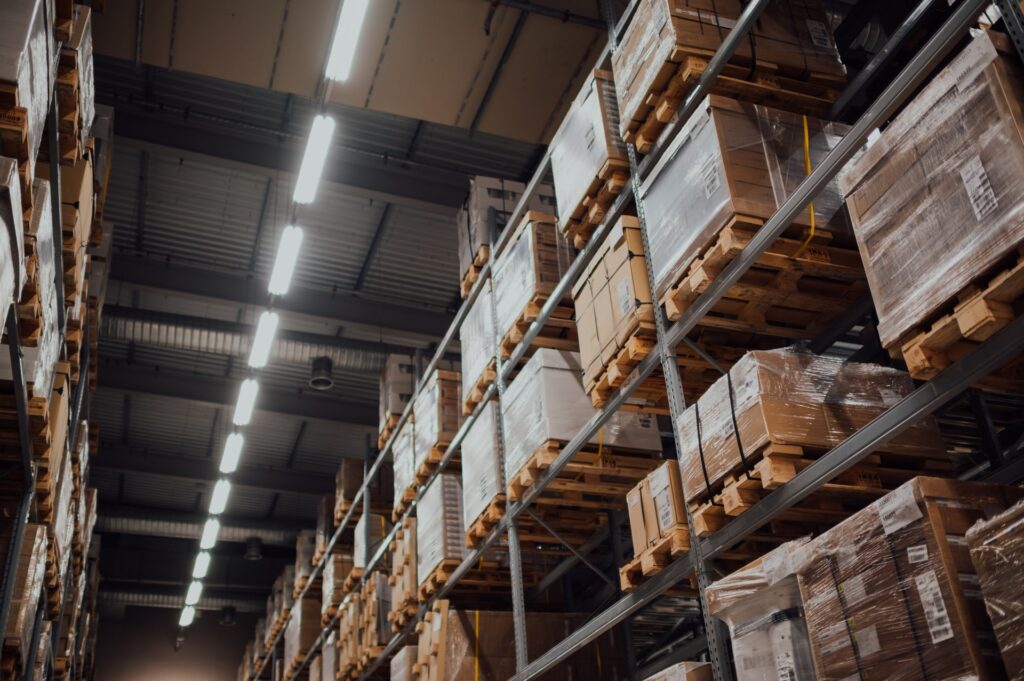
EPR therefore serves as a collective term for a wide variety of legal requirements with the aim of making the use of resources more sustainable. The best-known example is the Packaging Act (VerpackG), which creates a framework that requires manufacturers to pay their fair share in the recycling costs of the packaging that they put into circulation. Further applications of EPR can be found in the Battery Act (BatterieG) or in the Electrical and Electronic Equipment Act (ElektroG). These laws regulate the return and recycling of electronic devices and batteries/accumulators.
EPR: Who is affected?
EPR is primarily aimed at companies that manufacture physical products. Or companies that are responsible for importing physical products in a certain country and put it on the market. However, since EPR is a collective term for a wide variety of laws and different regulations are made in each country, it is not possible to determine affected business in general. Neither there is a universal list of measures that affected businesses need to take.
For example, different regulations apply to handling packaging in Germany than in Spain or Italy. And some EPR categories only exist (so far) in some countries. Being able to judge with certainty which EPR categories in which country your company is affected and what you need to do specifically is not an easy task: you need to know which EPR categories there are laws for in the respective country, read the laws and accordingly realize. In addition, changes can occur at any time.
Non-compliance – whether intentional or due to ignorance – can be punished with hefty penalties. The German Packaging Act alone provides for penalties of up to 100,000 €.
Ad
Always keep track of all EPR specifications with ecosistant
Our partner ecosistant has specialized in supporting e-commerce retailers in the legally compliant implementation of all EPR requirements in every EU country. ecosistant provides transparency and a structured overview on the maze of bureaucracy. ecosistant offers you:
- Time savings through digital compliance advice
- Guidelines for inexpensive EPR solutions – explained in way that is easy-to-understand
- Legal certainty and updates in the event of changes in the law
- Service can be booked for the entire EU or only for selected countries
With our partner code vpcksvgl10 you get 10% on all offers.
In the latest versions of the German laws, operators of Internet platforms and online marketplaces are required to obtain appropriate evidence of proper EPR registration from the registered dealers on their sites. Otherwise, the operators are liable for any violations by dealers. In Germany, there are now specific deadlines for 2 EPR categories by which Amazon, eBay and Co. must have obtained proof from retailers. If retailers fail to provide such evidence, accounts can be blocked and sales in Germany will be blocked. The affected EPR categories are:
Packaging, both primary (i.e. product packaging) and secondary packaging (i.e. shipping packaging): Evidence must be received no later than July 1, 2022
Electrical and Electronic Equipment (EEE): For all offers that fall under electrical and electronic equipment, proof must be available by January 1, 2023 at the latest
Batteries: so far, German legislation has not yet stipulated any obligation to provide evidence for internet marketplaces
EPR Category: Packaging (VerpackG)
One of the most important EPR categories is packaging. In 2020, an average of 78 kg packaging waste per capita was collected in private households in Germany (source: Federal Statistical Office). And this does not even include commercial packaging and transport packaging. Almost every company that deals with physical products also puts packaging into circulation and thus contributes to the 19 million tons of packaging waste that accumulate in Germany every year. And this trend in not unique to Germany. Packaging waster accounts for a large amount of waste in all countries. For this reason, every EU country has passed laws that oblige companies to participate in the recycling of packaging waste in accordance with the EPR principle.
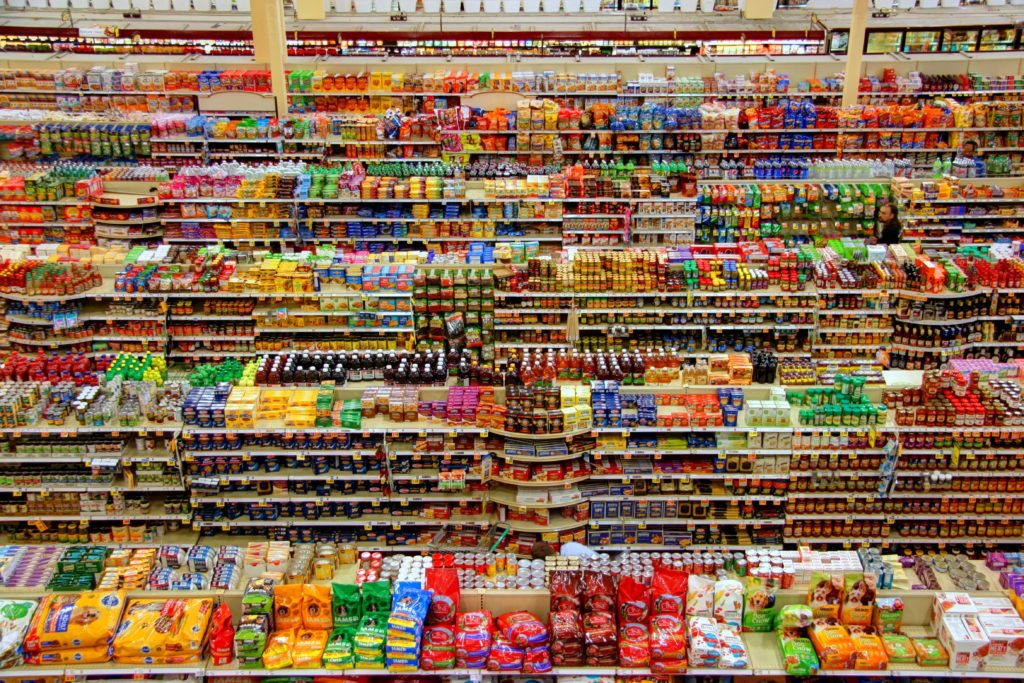
Germany - LUCID Registration & Packaging Licensing
In Germany, the Packaging Act (VerpackG) regulates the EPR category of packaging. Manufacturers must register with the Central Agency Packaging Register in the LUCID register. The number that you receive after registering in LUCID is your EPR number for packaging in Germany and serves as official proof on Amazon, eBay and Co. In addition, affected companies in Germany must obtain a packaging license for their packaging, which they place on the German market. In our guide to the Packaging Act, we show you in detail how you can implement all the requirements quickly and easily.
We can also help you to choose a suitable dual system (= provider of the packaging license). In our comparison calculator, you can simply enter your packaging quantities and immediately compare all prices:
Packaging License Calculator
Compare packaging license costs for your volumes across all providers
Other EU countries
Each EU member state has its own laws governing EPR for packaging. Different regulations apply to de minimis limits for packaging quantities. If those limits are not reached, the business is not affected by the local laws. Some countries, on the other hand, only oblige national manufacturers and no foreign dealers. In any case, you should inform yourself about every country to which you are sending physical goods. The most important questions per country are here:
- Are you affected by the national guidelines?
- If so, where do you need to register to get an EPR number?
- Is it necessary to purchase a packaging license or pay similar fees to participate in the recycling costs?
- Do other responsibilities like reporting duties, labelling requirements etc.?
Ad
Easily implement the obligations in all EU countries with ecosistant guidelines for the EPR category packaging!
With ecosistant you have access to the latest national regulations for packaging licensing for all EU countries. There are also helpful step-by-step instructions for registering with the foreign authorities, which are often only available in the local language without an English translation.
With our partner code vpcksvgl10 you get 10% on all offers.
EPR Category: Electrical Equipment (ElektroG & WEEE)
The second major EPR category is electrical equipment. Based on a 2012 EU directive on waste electrical and electronic equipment, all member states must establish regulations that ensure the recycling of electrical equipment. The directive mainly focuses on 2 aspects:
- Electronic devices often contain rare earths or valuable raw materials such as gold, copper or platinum. These raw materials should be extracted from the devices through professional recycling.
- It is not unusual that electrical devices contain chemicals or flammable substances. The disposal of these substances must be carried out professionally in order to prevent damage to people and the environment.
The second major EPR category is electrical equipment. Based on a 2012 EU directive on waste electrical and electronic equipment, all member states must establish regulations that ensure the recycling of electrical equipment. The directive mainly focuses on 2 aspects:
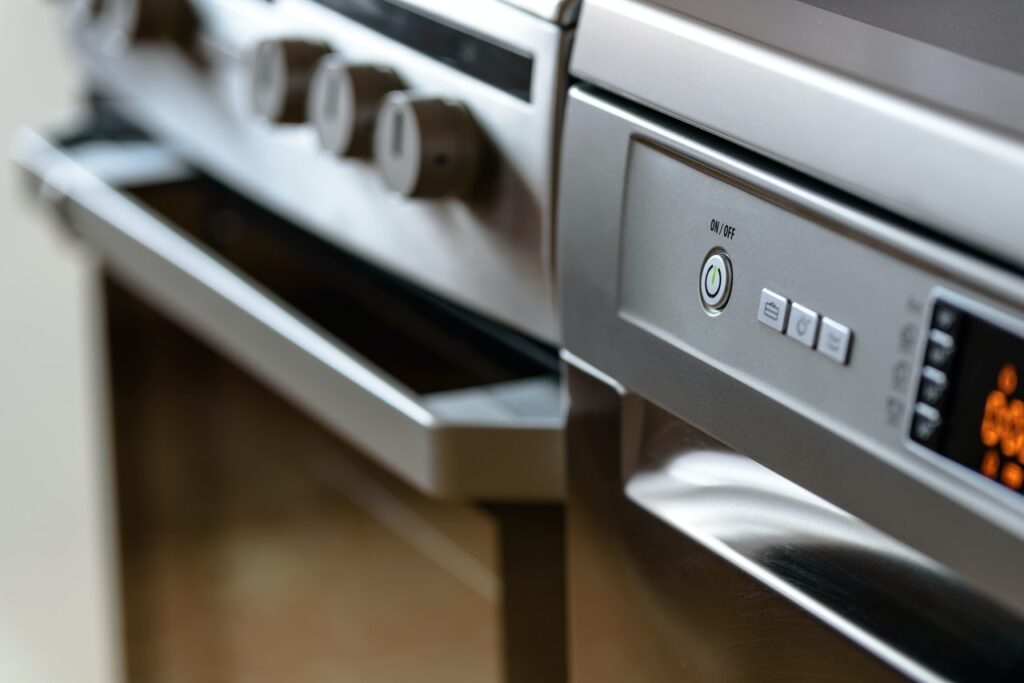
- Electronic devices often contain rare earths or valuable raw materials such as gold, copper or platinum. These raw materials should be extracted from the devices through professional recycling.
- It is not unusual that electrical devices contain chemicals or flammable substances. The disposal of these substances must be carried out professionally in order to prevent damage to people and the environment.
Normally, manufacturers or distributors of electronic devices are obliged to offer free redemption service for electrical devices and to pay for the recycling of old devices. Laws within the EPR category of electrical equipment are also often referred to as WEEE directives (Waste Electrical and Electronic Equipment).
Germany - ElektroG & WEEE Directive
In Germany, the ElektroG (ElektroG) regulates the WEEE directive. The latest version, the ElektroG 3, has been in effect since January 1st, 2022. An important addition in ElektroG 3 is the liability of internet platforms and fulfillment service providers in the event that they do not ensure that manufacturers and dealers comply with the legal obligations. Therefore, Amazon, eBay and Co. will probably also ask for more information from you as a dealer when it comes to the ElektroG.
Liable manufacturers and dealers according to ElektroG:
Every company (including importers and online dealers) that imports electronic devices with the following characteristics into Germany and puts in on the market there is affected: Devices, that have a) an AC voltage of no more than 1,000 volts or b) a DC voltage of up to 1,500 volts for operation. You can find a detailed list of device categories here. There is also a difference between B2C devices (devices for everyday use, available in retail outlets) and B2B devices (professional, specialist devices for commercial use).
Obligations according to ElektroG:
- Obligation to register with the Stiftung Elektro-Altgeräte Register (EAR) for all brands and device types – either as a manufacturer of B2C or B2B devices -> The EAR will then send you your German EPR registration number for WEEE
- Payment of fees to the EAR and filing of a guarantee service deposit
- various reporting requirements for sales volumes and returned devices
- For B2C device manufacturers: Participation in the collection coordination of the EAR and financial participation in recycling and disposal costs according to the polluter pays principle
- For B2B device manufacturers: Organization & ensuring the disposal of their own old devices
- Labeling of own devices with the crossed-out garbage can symbol
- Take-back and disposal obligation for companies with a shop, storage or shipping area larger than 400m2
- Obligations to inform: Communication of various information to customers
- For companies based outside of Germany: obligation to appoint an authorized representative who fulfills certain obligations on behalf of you
Other EU countries - WEEE Directive
Each EU country had to implement the WEEE directive into national law. However, there are major differences in how each country classifies electrical equipment, how registration is carried out and how manufacturers have to contribute financially to disposal costs. In addition, other information obligations to customers may apply. In order to prevent penalties and sales bans from authorities or your platform providers, we recommend that you check the following:
- Do you sell electrical appliances (with a plug or cordless or battery-powered) to EU countries directly or via platforms (Amazon, eBay, etc.)?
- If so, you should find out about EPR obligations for electronic devices for these countries. This is where ecosistant* can be of great help to get an overview of all regulations quickly and easily!
- Store registration number and, if necessary, information texts on products on Amazon/eBay.
Ad
Easily implement the obligations in all EU countries with ecosistant guidelines on WEEE!
ecosistant helps you with the country-specific analysis of whether your electronic devices are affected by national WEEE obligations and how you can implement these obligations quickly, cheaply and legally. If the law changes, you will always be up to date thanks to the ecosistant info service.
With our partner code vpcksvgl10 you get 10% on all offers.
EPR Category: Batteries (BattG)
The third major EPR category includes batteries and accumulators. There is also an EU directive for this – the European Battery Directive (BATT), which had to be implemented into national law by the member states. The directive describes sales, labeling and take-back requirements It also sets limits on heavy metals and other pollutants that batteries can contain. Safe and environmentally friendly disposal is also the focus here.
Manufacturers and distributors of batteries and accumulators should share the costs of recycling based on the quantities they put into circulation. They also should take back batteries/rechargeable batteries from customers free of charge and organize a proper disposal of old batteries.
The third major EPR category includes batteries and accumulators. There is also an EU directive for this – the European Battery Directive (BATT), which had to be implemented into national law by the member states. The directive describes sales, labeling and take-back requirements. It also sets limits on heavy metals and other pollutants that batteries can contain. Safe and environmentally friendly disposal is also the focus here.
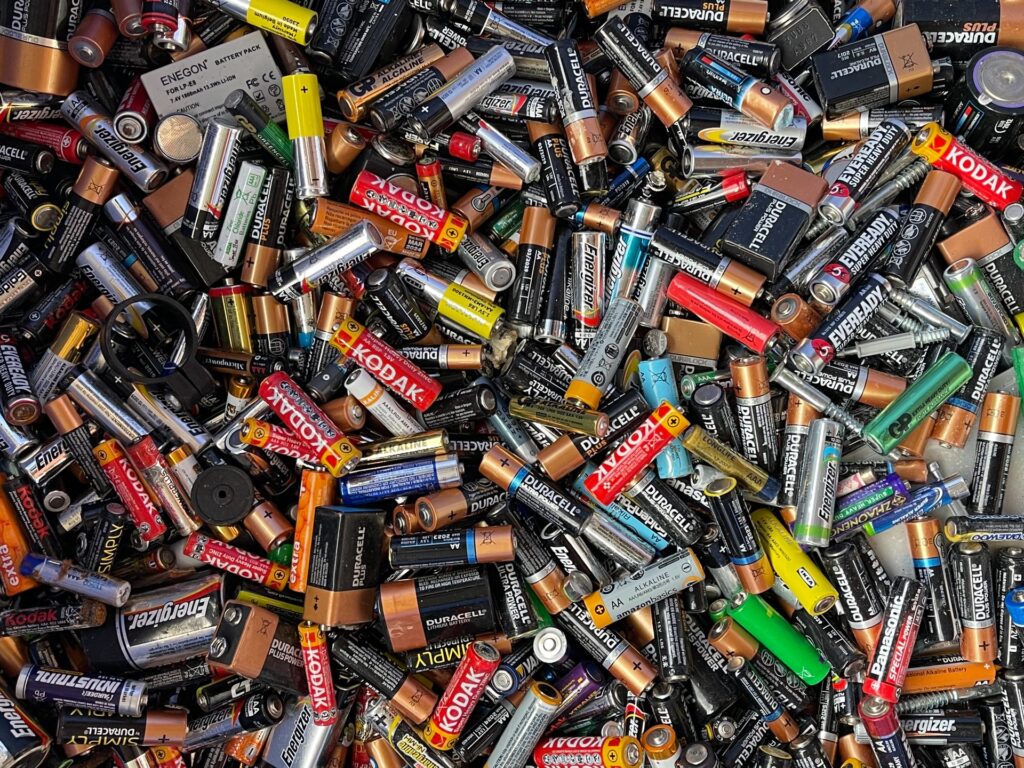
Manufacturers and distributors of batteries and accumulators should share the costs of recycling based on the quantities they put into circulation. They also should take back batteries/rechargeable batteries from customers free of charge and organize a proper disposal of old batteries.
Germany - Battery Act (BattG)
In Germany, the Battery Act (BattG) regulates the placing on the market and the return of batteries and rechargeable batteries. The national control authority in this regard is the Stiftung Elektro-Altgeräte Register (EAR). Registration, notification and cost sharing are all handled by the EAR. The BattG distinguishes between 3 types of batteries in Germany:
- Device batteries (mainly in portable consumer products)
- Industrial batteries (for agricultural or operational purposes, including e-car batteries)
- Vehicle batteries (for ignition, lighting, technology in the vehicle)
Two main groups are obligated under the BattG: Manufacturers of batteries an dealers:
- Manufacturers: This group includes all companies that bring batteries into circulation for the first time in Germany. That includes producers, businesses who commission productions under their own brand and importers who are putting batteries onto the market for the first time in Germany. Drop shippers or e-commerce dealers who resell foreign batteries to customers in Germany are also considered manufacturers.
- Dealers: This group includes dealers, distributors, middlemen who resell batteries in Germany.
Obligations according to BattG:
For manufacturers
- Obligation to register with the Stiftung Elektro-Altgeräte Register (EAR) as the initial distributor of batteries and rechargeable batteries on the market
- Payment of Fees to the EAR
- Various reporting obligations to the EAR
- Free take-back and disposal of used batteries
- For device batteries: Obligation to participate in a take-back system and payment of disposal costs to the commissioned system.
- For automotive/industrial batteries: hiring a recycling provider is not mandatory. Proper disposal can also be done on your own.
- Correct labeling of batteries and rechargeable batteries and communication of mandatory information
For dealers
- obligation to take back old batteries free of charge
- for vehicle batteries: collection of a deposit from the customer in the amount of €7.50 (gross) and refund on return.
- Fulfill notification obligations to end users
1. Possibility of free return for the end user at the retailer
2. Obligation of the end user to return used batteries
3. Explanation of the pictograms for batteries and rechargeable batteries
Other EU countries - BATT directive
All EU countries have passed different laws on the BATT directive. Registration requirements, financial participation, disposal and information requirements may differ from the procedure in Germany. Again, we recommend examining the following points:
- Do you sell products with batteries or rechargeable batteries to other European countries directly or via platforms (Amazon, eBay, etc.)?
- If so, you should inform yourself about EPR obligations for batteries in these countries. This is where ecosistant* can be of great help to get an overview of all regulations quickly and easily!
- Fulfill legal obligations (if necessary, registration, commissioning of a mandatory recycling company, payment of recycling fees, take-back obligation and information/labelling obligations)
- Store registration number and, if necessary, information texts on products on Amazon/eBay.
Ad
Easily implement the obligations in all EU countries with ecosistant guidelines for batteries!
ecosistant helps you with the country-specific analysis of whether you are affected by national battery laws and how you can implement the resulting obligations quickly, cheaply and legally. If the law changes, you will always be up to date thanks to the ecosistant info service.
With our partner code vpcksvgl10 you get 10% on all offers.
EPR on Amazon
As an internet platform, Amazon must actively check whether sellers on the platform are complying with their legal obligations regarding EPR in each country. If a seller does not submit the required information to enable Amazon to carry out a check, Amazon will block the account or disable the seller account from shipping in the concerned country.
All necessary information must be stored in Amazon Sellercentral. Amazon has added a new menu item for this: The EPR compliance portal. This is used to upload all EPR evidence for the packaging law and later also for the battery and electrical law for each country.
Store EPR numbers on Amazon
Amazon requests EPR registration numbers for various product categories such as packaging and electronics/batteries. Depending on which Amazon country marketplaces you sell on, you will see a list of all the countries for which you have to provide EPR evidence in the left menu. Within each country tab you will see the EPR categories for which a registration number is required. According to Amazon, the information to be stored is constantly being expanded. Merchants are usually contacted via email about new EPR regulations from Amazon. As usual, any deadline set by Amazon should be met to avoid account blocking.
EPR numbers Germany
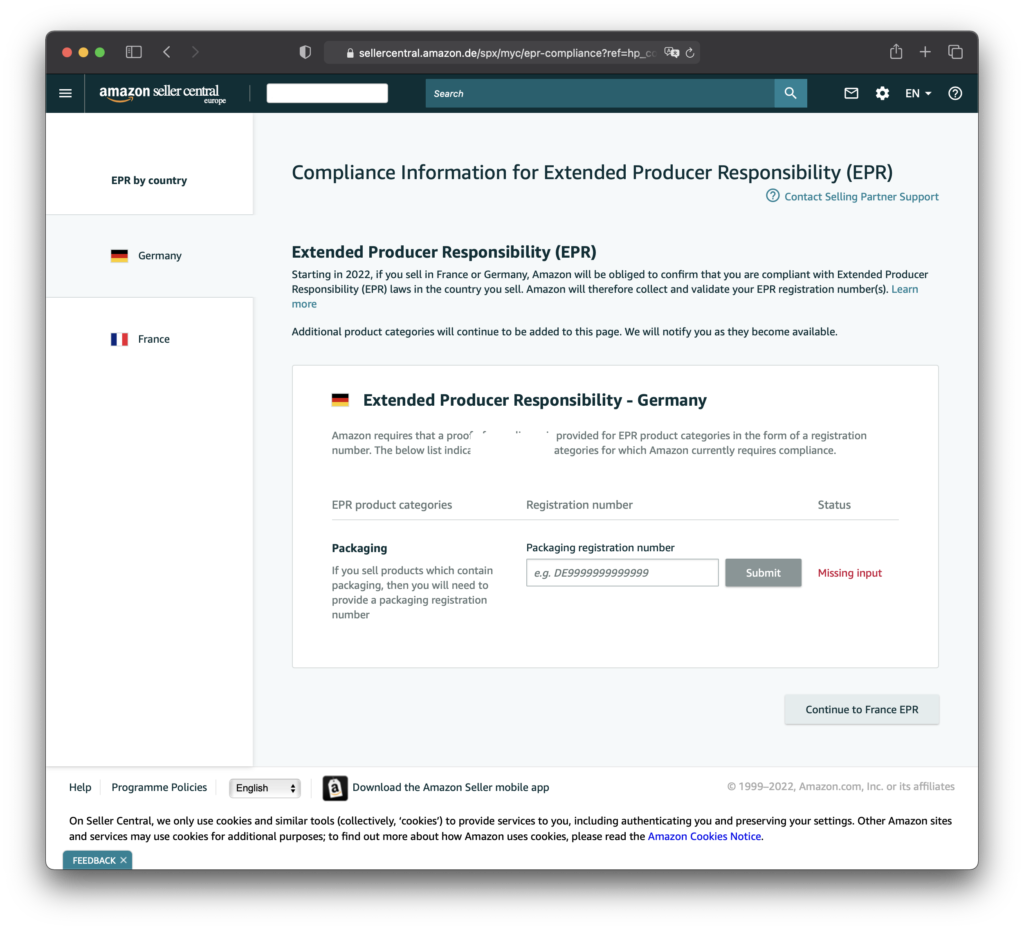
EPR numbers France
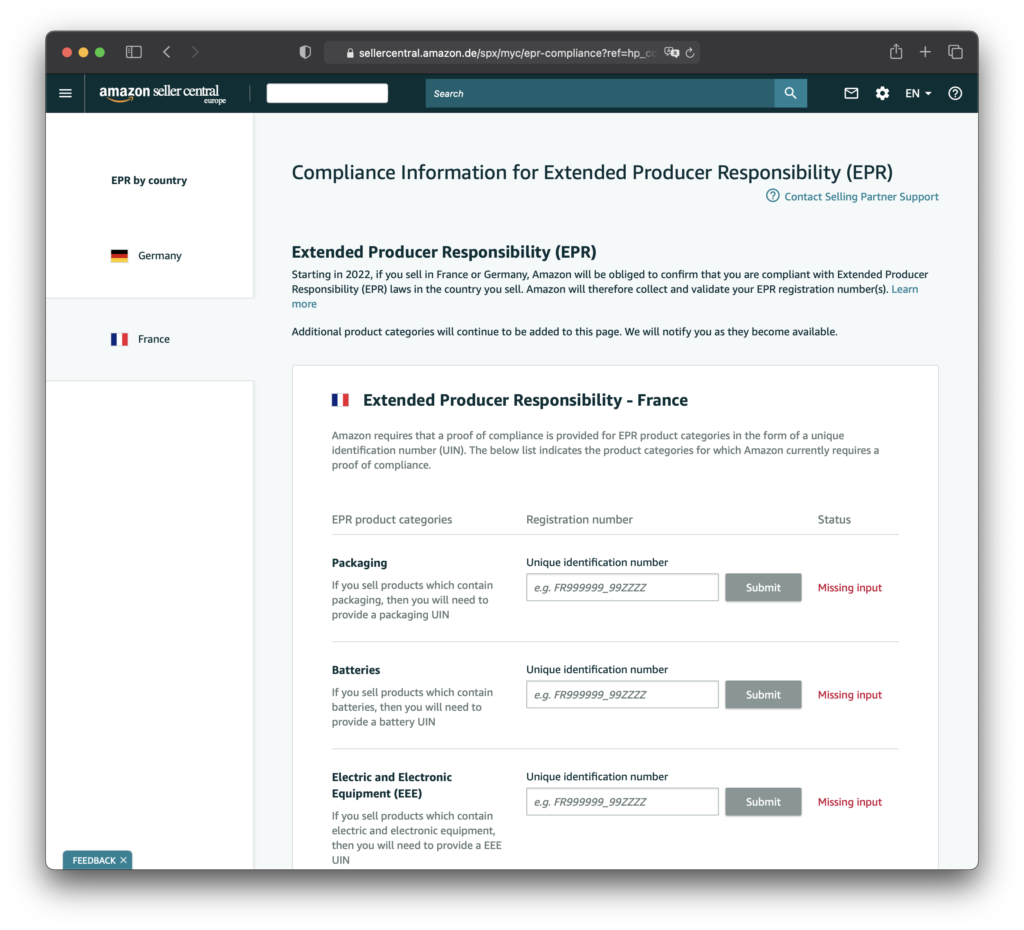
Packaging license Germany & France
Germany: As of now (April 2022), Amazon merchants are asked to provide an EPR number for packaging. This is your ZSVR registration number that you received when registering in the “LUCID” packaging register. If you have not yet created a registration number with LUCID and have not yet acquired a packaging license in Germany, we recommend our guide to the packaging law. We explain step by step your obligations are according to the German Packaging Act (VerpackG).
France: It is also mandatory for France to provide an EPR registration number if you are sending products to France. To avoid the risk of Amazon blocking your merchant account for selling in France, we recommend that you report the required information to Amazon completely and correctly. ecosistant* can help you with the packaging license in France and registration.
Electrical Appliances & batteries
Germany: Amazon does not yet request any EPR information from sellers for these categories.
France: You must file separate EPR registration numbers for both electrical equipment (WEEE) and batteries if you sell corresponding products to France. ecosistant* can tell you whether your products fall under the legal provisions for WEEE and batteries in France in their France country check. At ecosistant you will also receive detailed step-by-step instructions on how to obtain the relevant registration numbers for France.
Other EPR categories
Germany: Amazon does not yet request any EPR information from sellers for these categories.
France: France is much stricter here than Germany and regulates EPR in many other categories. If you sell products in France, you may also be required to submit proof of registration to the Amazon EPR compliance portal for the following EPR categories: tires, textiles, furniture, printing paper, chemicals, medical piercing devices. If you are affected, ecosistant* can use the EPR compliance guide for France to explain in detail how you can obtain the relevant evidence.
Ad
Full compliance advice for France from ecosistant
For just 22,41 € – use our 10% partner code vpcksvgl10 to get EPR compliance advice for France fully tailored to your business, with concrete step-by-step instructions on Packaging Licence, WEEE, BattG, Textile, Furniture & Mattresses.
EPR on eBay
EPR requirements for Germany
On 6.4.22, eBay has officially announced that it will start checking the EPR obligations for packaging of all merchants on the German marketplace ebay.de. All sellers have been contacted via email about this. We strongly advise all eBay merchants who have not yet purchased a packaging license to do so now. If you still need a license, you can use our free packaging license price calculator to find the cheapest provider. According to eBay, 2 pieces of information need to be submitted:
- The EPR registration number for packaging (= LUCID number).
- A written proof from your packaging license provider (e.g. annual invoice)
On 6.4.22, eBay has officially announced that it will start checking the EPR obligations for packaging of all merchants on the German marketplace ebay.de. All sellers have been contacted via email about this. We strongly advise all eBay merchants who have not yet purchased a packaging license to do so now. If you still need a license, you can use our free packaging license price calculator to find the cheapest provider.
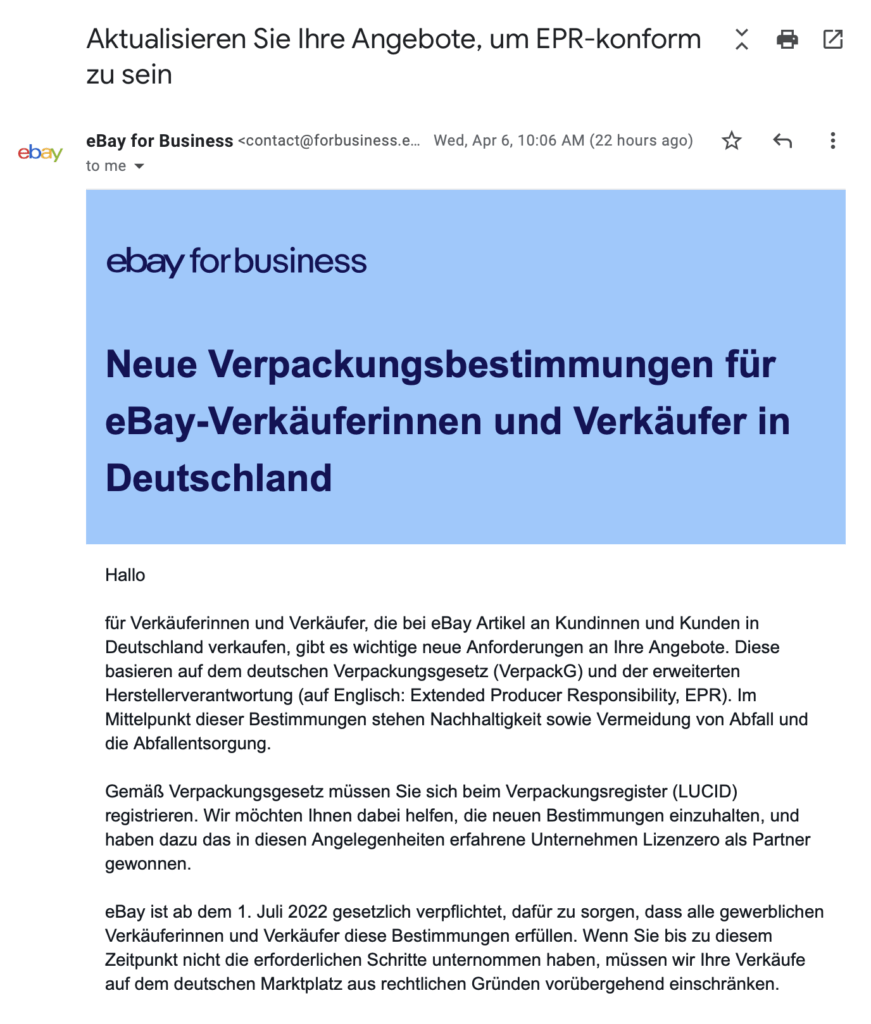
According to eBay, 2 pieces of information need to be submitted:
- The EPR registration number for packaging (= LUCID number).
- A written proof from your packaging license provider (e.g. annual invoice)

The LUCID-Nr. can be added directly in your account information on eBay.de. Simply go to My eBay – Account settings – Company details. Here, you will find a new field for the LUCID-Nr. where you can enter your EPR registration number for packaging in Germany.
EPR requirements for France
eBay requests some EPR informations from merchants selling products on ebay.fr. Those EPR information must be included in the listing description of each product that is on sale in France. For this purpose, the new category "Compliance" was added to eBay's new listing tool as well as the sub-item Extended manufacturer responsibility.
Specifically, eBay has 4 new EPR disclosures that need to be filled in depending on the type of product:
- UPIN (Unique Manufacturer Identification Number) = EPR Registration Number (for all products)
- eco-participation (for products in the “Furniture” and “Electrical and Electronic Equipment” categories)
- Repair score (for products in the categories “washing machines with windows”, smartphones, notebooks, televisions & electric lawnmowers
- Take-back policy (for electronic devices, furniture, disposable gas cartridges, pyrotechnics, fire extinguishers)
Packaging
For all products listed on ebay.fr, you must provide an EPR registration number for packaging (product and shipping packaging). You can do this very easily by entering your French EPR number for packaging as the UPIN in the following form fields:
- “Product Package ID” – for the product packaging
- “Shipping Package ID” – for any additional shipping packaging
- “Product Document ID” – if available, for paper instructions or other printed matter accompanying the product.
Electrical Appliances & batteries
- Here you have to enter your EPR registration number for WEEE or batteries as UPIN under “Producer Product ID”.
- Under eco-Participation you must also enter the recycling fee for the product, which you pay to the recycling system that you have contracted for WEEE.
- If you have to take back used products free of charge, you must display the relevant return conditions in your eBay listing. To do this, you must first create a corresponding policy in your eBay account: Go to Selling -> Custom policies -> Create policy -> Take-back and enter the content. You can then select the condition you just created in the product listing. In the listing tool select Regulatory compliance -> Take-back policy and choose the one you have created before.
- You may have to provide a Repair score on the product page in accordance with legal requirements. eBay suggests showing this in the photo gallery.
Other EPR categories
Depending on the product category, you must provide the EPR registration number for each listing in the “Producer Product ID” field, identify the eco-participation costs, add repair score and set a take-back policy.
Ad
Full compliance advice for France from ecosistant
For just 22,41 € – use our 10% partner code vpcksvgl10 to get EPR compliance advice for France fully tailored to your business, with concrete step-by-step instructions on Packaging Licence, WEEE, BattG, Textile, Furniture & Mattresses.
EPR on Etsy
The e-commerce platform for handmade and vintage products “Etsy” is also affected by the new legislation and must therefore obtain proof of proper compliance with the EPR guidelines from all retailers. Again, this primarily affects merchants who ship their products to Germany or France. Specifically, this information is required:
- The EPR registration numbers
- A written proof of payment of recycling fees (e.g. annual invoice) like the packaging license in Germany or France.
- Offer customers the possibility for free returns of their used/old products if you sell specific product categories (only applies to France).
In France, the regulations have already been in place since 1.1.2022. For Germany, Etsy merchants must provide the required evidence by 1.7.2022 at the latest in order to continue selling products via Etsy to consumers in Germany. We also advise all Etsy merchants who have not yet bought a packaging license for their packaging materials to do so now. If you still need a license, you can find the cheapest provider with our free price comparison calculator.
Add EPR registration numbers
Merchants can easily add their EPR numbers in the Etsy Shop Manager. We show you how to do that:
EPR registration numbers for Germany
So far, only the LUCID ID number (= registration number for packaging) needs to be submitted by merchants. The number can be easily added in the Etsy Shop Manager. You can find this option in the Finances menu under Legal and tax information.
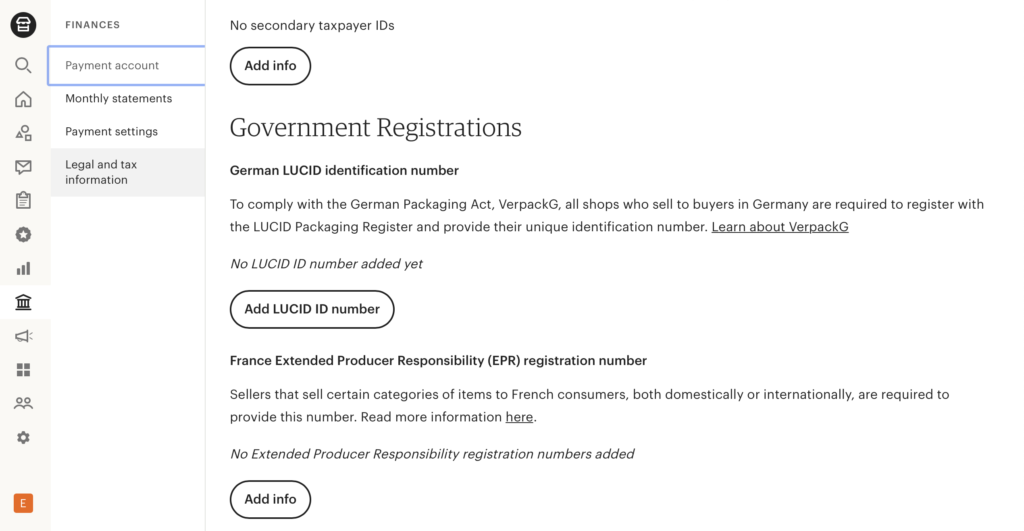
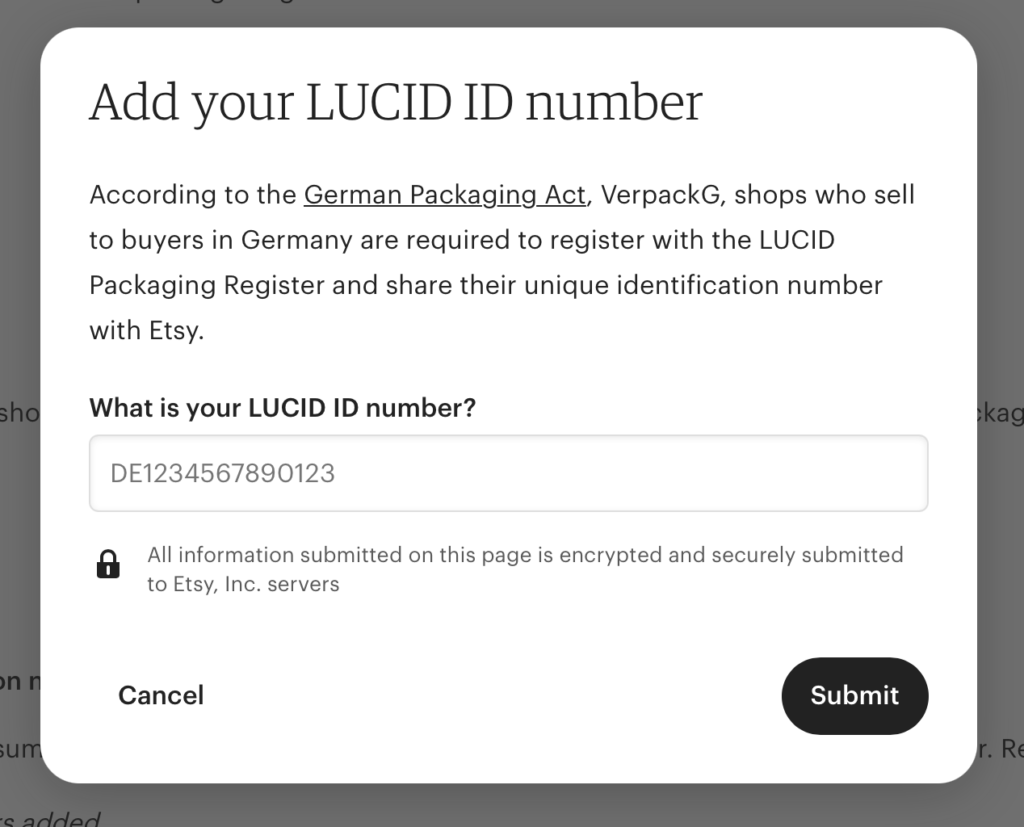

Click on Add LUCID ID number. In the pop-up that opens next, enter your registration number and submit it. Done!
EPR registration numbers for France
In France, the current EPR requirements for retailers are significantly more complex than in Germany. For example, in addition to the “packaging” category, EPR registration numbers must also be entered for other categories if you sell products to France that are subject to these further EPR regulations. Possible EPR categories for France can be:
- Printed papers and paper for graphic use
- Construction materials and households products
- Electrical and Electronic Equipment (WEEE)
- Batteries an accumulators
- Chemical products
- Furniture
- New clothes, shoes, textiles
- Toys
- Sports & leisure goods
- DIY & garden items
- Packaging
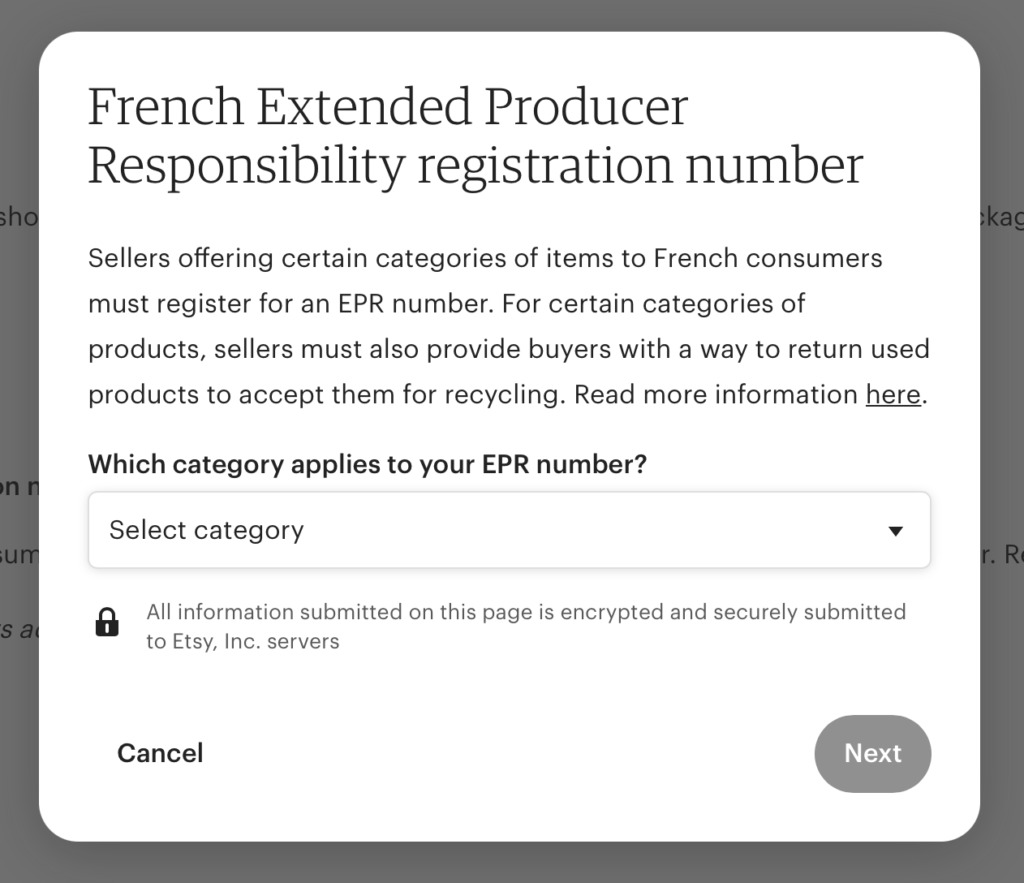
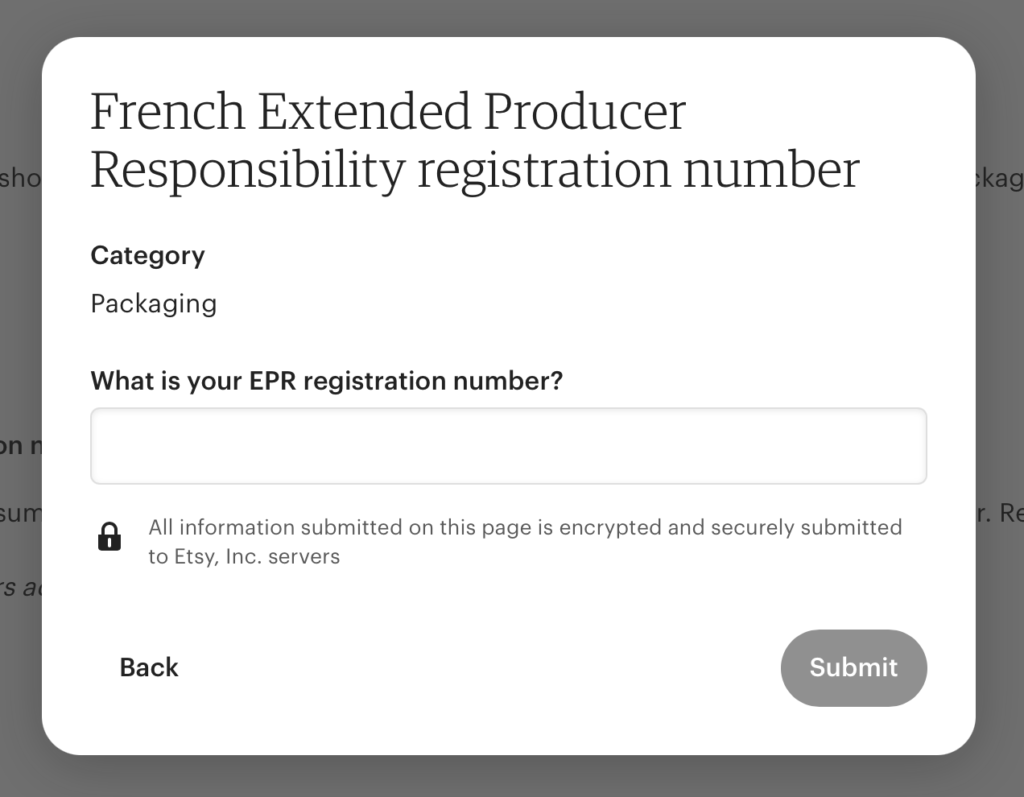

For each French EPR category you fall into, you need to submit the EPR number to Etsy. In the Etsy Shop Manager > Finance > Legal and tax information click on the “Add Info” button that appears under the France Extended Producer Responsibility section. There you can enter each EPR registration number.
Important: Etsy requires all merchants to also include their EPR registration numbers for France in the store terms and conditions or in the message to buyers, making them available to customers.
You are unsure which EPR categories you all fall into with your Etsy listing in France? Our partner ecosistant can help you. With their assistance, you can assure that you fulfill all requirements related to EPR in France legally secure, fast and at cheap costs.
Proof of license / recycling fees
We expect that in the future Etsy will also require written proof from merchants of participation with a recycling organization such as dual systems, wherever such recycling fees are required by law. As for now, Etsy is not specifically requesting this proof. However, we advise all Etsy merchants to start preparing these documents now.
Proof for Germany
For Germany, this proof can be any official document from your packaging license provider (dual system). For example, your annual invoice that states the packaging volumes which you have licensed with that provider for the year.
Proof for France
Such evidence may also be requested for France in the future. This can also be the invoice or other written confirmation from the Producer Responsibility Organization. For the EPR category packaging, this could also be the receipt for paying the 80€ flat fee.
Ad
Full compliance advice for France from ecosistant
For just 22,41 € – use our 10% partner code vpcksvgl10 to get EPR compliance advice for France fully tailored to your business, with concrete step-by-step instructions on Packaging Licence, WEEE, BattG, Textile, Furniture & Mattresses.
Ad
This is how ecosistant helps you with EPR implementation
The founding team of ecosistant has a background in e-commerce themselves and therefore knows exactly what retailers need. Annoyed by the different EPR regulations in every EU country, they created ecosistant, a digital EPR compliance consultancy that is tailored precisely to the individual requirements of e-commerce merchants.
One dashboard for everything
After answering a few specific questions about your company’s activities in the individual countries, you can see exactly which EPR measures you have to implement per country on your ecosistant dashboard. You will see all deadlines that exist and whether there are any recent changes in the laws that affect you and require your attention.
Packaging, electronic devices, batteries and more: ecosistant explains exactly what you need to do for each EPR category in your individual situation. From registering with authorities to participating in recycling schemes. Thanks to many years of experience in the market, ecosistant can suggest cheap and quick solutions for the EPR in every country. ecosistant will guide you through the respective registration process in detail. Even if this is only available in the national language.
After answering a few specific questions about your company’s activities in the individual countries, you can see exactly which EPR measures you have to implement per country on your ecosistant dashboard. You will see all deadlines that exist and whether there are any recent changes in the laws that affect you and require your attention.
Packaging, electronic devices, batteries and more: ecosistant explains exactly what you need to do for each EPR category in your individual situation. From registering with authorities to participating in recycling schemes. Thanks to many years of experience in the market, ecosistant can suggest cheap and quick solutions for the EPR in every country. ecosistant will guide you through the respective registration process in detail. Even if this is only available in the national language.
Save time and money with ecosistant
The ecosistant team believes that you should rather put your time and energy into your own business than finding a way out of the bureaucratic mazes for EPR in each country.
With the solutions from ecosistant you save time in fulfilling your EPR obligations. At the same time, ecosistant monitors the legislation in each country, checks for new laws and immediately informs you when new/changed EPR requirements are passed and how you need to react. This way, you are always legally secured. No need to fear penalties or account blocking by Amazon or eBay because of new regulations you were not aware of.
Benefit from our exclusive partner offer with ecosistant
With our exclusive partner code vpcksvgl10 you get a 10% discount on all ecosistant services. You can choose between 3 packages: Individual country packages are the right choice if you only send goods to selected EU countries. With the Europe package, you get the complete EPR service for all 27 EU countries + Switzerland, UK and Norway. With the premium package, ecosistant also handles all official reports for you and handles all EPR-relevant obligations as an authorized representative.
The EPR service for packaging is included as standard in all packages. Optionally, you can also book other EPR categories such as WEEE, textiles and furniture as add-ons per country and year.
Per Country
Digital compliance advice
- Individual information for your sales markets
- Information on mandatory recycling symbols
- Always up-to-date
- recommendations about tested recycling systems
- Optional: Add-on for WEEE & Batteries, Textile, and Furniture EPR per country
22,41 € 24,90 €
With partner code vpcksvgl10
All of Europe
EPR Compliance – Europe-wide
- All features of the country package
- Europe-wide for 30 countries
- Comprehensive report on EU mandatory recycling symbols
- All future updates included
- Over 45% cheaper
- Best value for money
- Optional: Add-on for WEEE & Batteries, Textile, and Furniture EPR Europe-wide
With partner code vpcksvgl10
Premium-Service
Lean back!
- ecosistant takes care of licensing and quantity reporting for you in all countries
- For packaging or for any other EPR waste stream (WEEE, Textile, Furnitrue…)
- Support with mandatory recycling symbols
- More time for your core business
- Personal account manager
on request
With partner code vpcksvgl10
*if a contract is concluded with ecosistant using our redeemed partner voucher code, we receive a commission from ecosistant. You will not incur any additional costs.


